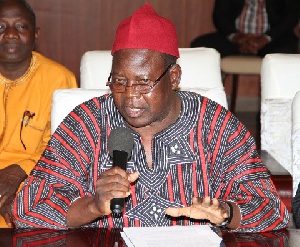The Ghana Integrity Initiative (GII) has vowed to strictly monitor recent interventions outlined by President John Mahama at the Flagstaff House, Accra to curb monstrous corrupt deals.
Vitus Adaboo Azeem, Executive Secretary of GII, speaking to journalists in Accra Monday to mark the United Nations Anti-Corruption Day, said such interventions include the retrieval of monies wrongfully paid or misappropriated by individuals or companies under contracts with SADA, GYEEDA and the Ghana Revenue Authority (GRA).
According to him, even though the President had instituted such measures, the media and well-meaning Ghanaians in general must keep an eye on stinky and shady deals.
Calling for the retrieval of monies that were wrongfully paid to companies such as Waterville and Isofoton, Mr. Azeem called on Economic and Organized Crime Office (EOCO) to make the update on the ongoing investigations on the issues known to the members of the general public in order for them to know what actions were being taken.
He also said a review or suspension of a contract with Subah Infosolutions, including the recovery of all monies that were wrongly paid were necessary to halt the numerous corrupt deals in the country, among others.
“GII will continue to strategically entrench grass-root participation in the fight against corruption. This, it has considerably demonstrated through several interventions including the establishment of over 13 anti-corruption and social auditing clubs in selected districts/regions of Ghana. We will effectively carry out our anti-corruption agenda by monitoring the President’s commitment.
Measures adopted by Government to tackle corruption include review of all transactions involved in the implementation of the policy within three calendar months, the refusal of any request by any government official to purchase any state vehicle that was assigned to them for official use.
Additionally, cases from the Auditor-General’s report are expected to be submitted to EOCO for investigation and possible prosecution before the Financial Tribunal, which has not been established.
Business News of Thursday, 12 December 2013
Source: Daily Guide













